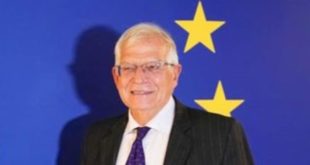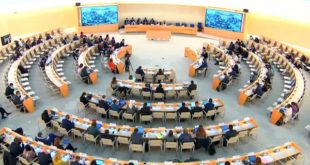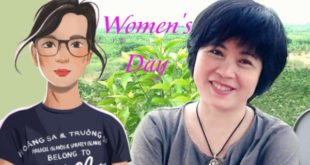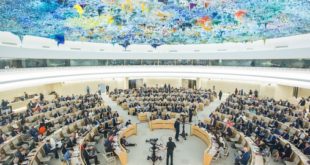GENEVA, 20 June 2014 (Vietnam Committee) – At the United Nations Human Rights Council in Geneva today, Vietnam rejected 45 key recommendations made by member states to improve human rights protection and uphold the fundamental rights of its citizens in Vietnam. The Council was examining the Working Group’s report on Vietnam’s Universal Periodic Review (UPR) held on 5 February 2014. Vietnam was given until this current session to inform the Human Rights Council which recommendations it will accept or reject for the next four years.
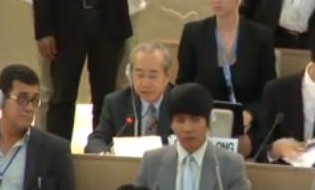 |
In an Oral Statement on behalf of Acting Together For Human Rights and Vietnam Committee on Human Rights (VCHR), Mr. Vo Van Ai, VCHR President, strongly criticized Vietnam and highlighted continuing widespread abuses against civil society activists, bloggers and human rights defenders in recent months, including Police violence, harassments and arbitrary detention. He raised the cases of journalists and bloggers Truong Duy Nhat, Pham Viet Dao and Nguyen Huu Vinh (blog name Anh Ba Sam), as well as prominent Buddhist dissident Thich Quang Do and youth leader Le Cong Cau (see full text below).
“Vietnam is second only to North Korea in the number of recommendations made by UN member states at its UPR”, said Vo Van Ai. “Out of 227 concrete recommendations, Vietnam accepted only the most general ones, whilst rejecting 45 concrete, positive steps which would have helped significantly to protect its citizens’ fundamental freedoms and rights”.
In its report to the Human Rights Council, of which the VCHR has obtained a copy, although it was not made public on the UN website, contrary to UN rules, Vietnam rejected recommendations to sign the Optional Protocols to the UN Covenant on Civil and Political Rights and other international human rights treaties it has ratified. The Optional Protocols are very important because they enshrine the right of individuals to lay complaints against the government for violations of these treaties. Vietnam also rejected a recommendation to extent a standing invitation to all UN Special Rapporteurs to visit Vietnam (proposed by UK, Austria, Czech Republic). It rejected 20 recommendations concerning the death penalty, and refused demands to release prisoners detained arbitrarily according to the UN Working Group on Arbitrary Detention (Germany, Switzerland, New Zealand).
Vietnam also refused recommendations by the United States and France to revise vague national security laws used to suppress universal rights, notably articles 79, 88 and 258; by Austria to provide public information on the number of detention camps and the number of prisoners detained therein, and by the Czech Republic to ensure independence of the media and release all human rights defenders, journalists and religious and political dissidents detained for the peaceful expression of their opinions.
Against a backdrop of ongoing arrests in demonstrations against Chinese encroachments on Vietnamese waters and lands, Vietnam rejected recommendations to enact laws to provide for peaceful demonstration (Australia) and end prosecution of peaceful protesters (Greece). It refused to explore possibilities for technical support through the Working Group on Enabling and Protecting Civil Society of the Community of Democracies (Canada), and, not surprisingly, to enhance equal political participation by its citizens and take steps towards multi-party democracy (Czech Republic).
Prior to the Human Rights Council session, the VCHR had issued a joint briefing paper with the International Federation of Human Rights (FIDH) urging UN member states to press Vietnam to accept meaningful recommendations in 15 crucial sectors, including freedom of expression, religion and assembly, human rights defenders, legal reforms, the release of prisoners of conscience, worker rights, the death penalty, women’s rights and cooperation with UN mechanisms.
In his statement, Mr. Vo Van Ai called on Vietnam to respect its own Constitution and its international commitment “to uphold the highest human rights standards as a member of the Human Rights Council”. Vietnam’s next UPR will be in 2018, when it will have to report to the Council on its implementation of all the human rights recommendations accepted at today’s session.
AT THE UN HUMAN RIGHTS COUNCIL
Working Together for Human Rights and the Vietnam Committee on Human Rights welcome the numerous recommendations on civil society and human rights defenders. Vietnam has accepted and says it is implementing Tunisia and Ireland’s recommendations to facilitate a safe and enabling environment for all civil society actors, yet we continue to receive widespread reports of harassment and threats against them, including those who cooperate with international mechanisms.
In recent months, scores of bloggers, human rights defenders and civil society activists have been beaten and intimidated by plain-clothed security agents in order to frighten them into silence. In a continuing crack-down on freedom of expression, at least five bloggers, online journalists and activists have been arrested or sentenced to up to 15 years in prison on vaguely-worded “national security” provisions in the Criminal Code which are totally inconsistent with the ICCPR. They include prominent bloggers Truong Dinh Nhat, Pham Viet Dao and Nguyen Huu Vinh (blog name AnhBaSam).
Vietnam has accepted recommendations to protect religious freedom, but it imposes a draconian system of registration which criminalizes religious practices outside State-approved bodies. Thich Quang Do, leader of the Unified Buddhist Church of Vietnam remains under house arrest after 30 years in detention, and Buddhist youth leader Le Cong Cau has been und er house arrest since January for demanding legal status for the UBCV and sending an audio message to the United Nations for Vietnam’s UPR.
We call on Vietnam to release all persons arbitrarily detained for the peaceful expression of their opinions and beliefs, in respect of its own Constitution and its commitment to uphold the highest human rights standards as a member of the Human Rights Council.
To ensure effective implementation of the UPR recommendations, Vietnam should take urgent steps to respect its citizens’ fundamental freedoms and rights, including freedom of expression online and offline, freedom of religion, peaceful assembly and association.
Thank you for your attention.
 Quê Me Quê Me: Action for democracy in Vietnam & Vietnam Committee on Human Rights
Quê Me Quê Me: Action for democracy in Vietnam & Vietnam Committee on Human Rights

